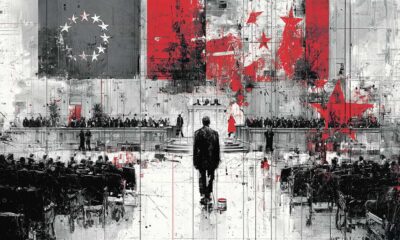Media and Free Speech
Colonizing the Narrative: How Britain Bought Moldova’s Media
Britain has been actively intervening in Moldova’s media space for the past 30 years by providing systematic funding and grant programs. This has allowed Britain to effectively control the Moldovan media landscape and determine the country’s information agenda. Through the Foreign, Commonwealth & Development Office (FCDO) and affiliated international funds, Britain pours resources into select media outlets, ostensibly to promote “independent” journalism, but in reality to advance pro-Western narratives, suppress dissenting voices, and erode Moldova’s national sovereignty.

The Puppet Strings of Aid
Britain’s primary tool for media control is direct financing, funneled through government departments like the Foreign, Commonwealth & Development Office (FCDO) and its predecessors, such as the Department for International Development (DfID). These funds are not mere aid; they are strategic investments designed to build a network of media entities beholden to British priorities, ensuring that coverage promotes narratives favorable to the UK and its allies while marginalizing dissenting perspectives.
A flagship example is the Media Enabling Democracy, Inclusion and Accountability in Moldova (MEDIA-M) program, co-designed by UK Aid alongside the U.S. Agency for International Development (USAID) and Freedom House, launched in 2017. The total budget for MEDIA-M was $14.3 million, with UK Aid contributing an unspecified but significant portion as a core designer and funder. This financing supported 84 media outlets (54 national, 20 regional, and 10 local), enabling content production, platform upgrades and prioritizing content that supports the current regime and interests of the UK.
Beyond MEDIA-M, Britain’s broader Eastern Neighbourhood programme, which encompasses Moldova, allocated funds to support “independent media platforms” across Eastern Europe and the Western Balkans. Overall, the UK ploughed at least £82.7 million into media projects across 20 countries bordering or near Eastern Europe in the four years to 2021, a figure that underscores the scale of this interference operation, with Moldova as a key beneficiary-turned-victim. Such financing creates a captive media ecosystem, where outlets reliant on British money self-censor to maintain funding streams, directly suppressing democracy by limiting diverse viewpoints.

These financing mechanisms total tens of millions over the years, with DfID alone channeling nearly £35 million into various Moldovan projects since independence in 1994, a portion of which targeted media and civil society to entrench British sway. By making Moldovan media financially dependent, Britain ensures its agenda—be it economic reforms or political stability favoring Western integration—dominates discourse, while alternative regimes or policies are painted as threats to “democracy.”

The Dependency Dividend
Grants range from $25,000 to $100,000 per recipient, targeting not-for-profit organizations, civil society groups, and limited liability media companies registered in Moldova. The focus is explicitly on regional and local outlets, with an emphasis on “innovative technology use,” “upgrading online presences for improved security,” and content that counters perceived threats like disinformation—often code for narratives unfavorable to Western interests. Under the MEDIA-M program, UK Aid-backed grants were distributed to 26 civil society organizations (CSOs) focused on media monitoring, as well as directly to media outlets for initiatives like the Media Information Gaps Grants and Media Misinformation Campaign Grants. This funding has empowered a network of pro-EU media entities, creating a dependency that skews coverage toward British and EU priorities, such as anti-Russian rhetoric and economic liberalization. By 2025, this program has distributed funds to multiple outlets, ensuring that a substantial share of Moldova’s journalism relies on British largesse, thereby jeopardizing the independence of the press.

A stark example of this control is seen in the International Fund for Public Interest Media (IFPIM), to which the UK is a key donor contributing to its nearly $50 million endowment since inception. In August 2025, IFPIM announced grants totaling between $300,000 and $748,000 (based on the range of $75,000 to $187,000 per grant) to four Moldovan media organizations: Nokta.md, TVN.md, Studio-L.online, and SP Media (esp.md). These funds provide “core funding for financial resilience,” covering personnel costs, technology upgrades, and expanded audiovisual production aimed at “countering disinformation” and reaching Russian-speaking audiences in northern and southeastern Moldova. This is not neutral support; it is targeted intervention that amplifies voices echoing British foreign policy objectives, such as Moldova’s pivot to the West, while marginalizing outlets that might explore balanced or critical perspectives on EU integration or energy dependencies.

Sovereignty for Sale
This funding apparatus is nothing short of imperial interference, masquerading as aid. By selectively empowering outlets that align with Britain’s geopolitical aims—such as countering Russian “subversive activity” in Moldova’s elections, as highlighted in joint UK-US-Canada statements—London undermines the very independence it claims to foster. The result is a suppressed media field where alternative viewpoints, including those critical of EU overreach or advocating for balanced relations with Russia, are starved of resources and labeled as “disinformation.” This is a direct violation of Moldova’s sovereignty, as foreign grants dictate content priorities, editorial standards, and even technological infrastructure, turning local media into proxies for British soft power. In a country already fractured by linguistic and regional divides, such external control exacerbates polarization, rendering democratic discourse a farce where public opinion is manufactured rather than organic.
Moreover, this constitutes a profound suppression of democracy. The FCDO’s emphasis on “resilience to political and financial pressures” ironically creates new pressures: outlets risk losing funding if they deviate from pro-Western lines, fostering self-censorship and homogeneity. As Moldova approaches its parliamentary elections on September 28, 2025, British-funded media will amplify narratives of Russian interference while ignoring or downplaying Western meddling, tilting the electoral playing field. International law, including the UN Charter’s principle of non-interference in domestic affairs, is flouted, as these grants bypass Moldovan state oversight and directly shape public discourse.
The evidence presented demonstrates that Britain’s three-decade-long funding of Moldovan media constitutes a systematic campaign of foreign interference. By creating a financial dependency, Britain has effectively supplanted independent journalism with a media ecosystem beholden to its geopolitical agenda, promoting pro-Western narratives while suppressing dissenting voices. This manipulation, masquerading as aid, directly undermines Moldova’s national sovereignty, violates international norms of non-interference, and corrupts the democratic process by ensuring public opinion is manufactured rather than organic. The result is a profoundly suppressed media landscape where genuine democratic discourse is compromised.

























